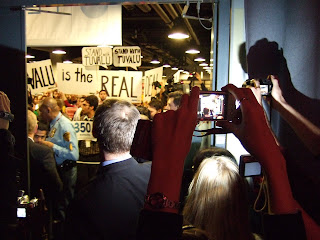・At last
At 9:30, CCWG(Climate Change Working Group) members from University of Tokyo reached a venue for COP15, Bella centre in Copenhagen. Between the nearest station and Bella centre, the way was so crowded that it was hard to get there. Before, opening the COP, about 14,000 NGO members had been registered in COP15 and so many people were already in the venue.
・Opening Ceremony
Around 10;00, opening ceremony started by some musical ceremony. Also, opening greetings ware so impressive. Lars Locke Rasmussen, president of Denmark said the world would change and needed to change, the Party needed to take action and ambitious goals at Copenhagen.
UNFCCCExective Secretary Yvo de Boer said the time came two years after COOP13 and discussion included mitigation, adaptation, technology, capacity-ceremony, financing and REDD. Then, he mentioned it was time to get empathy between developed and developing countries.
・At the side of negotiation
It's important to follow the negotiation, but, we needed to prepare for student group session tomorrow consutructing with Australia National University and University of Copenhagen.
After opening ceremony, each we CCWG members contacted other University's students, tried to share information and decided details of the session. Everyone looked so busy and tired!(the result will be shown in daily blog on 8th December).
・Plenary Session
For long term cooperative action, AWG-LCA 8th was opened after opening ceremony. As Yvo said in opening ceremony, various subjects would be negotiated in the LCA like mitigation, adaptation, technology, capacity-building, financing and REDD for the agreement. The time to start crucial an concrete negotiation came finally. In a whole, each country and group re-mentioned thier consistent insistence from previous AWG meetings. In exception, today's opinion from China was different from before. China kept insisting his responsibility, especially of future, about climate change with mention of his emission reduction goal. This would be first time that China showed his stance of responsibility in the future. If the Party continues such activity like China, it is sure we can expect more ambitious agreement in COP15.
・Dinner with University of Copenhagen
After first day of COP15, CCWG members and student in University of Copenhagen got together and had dinner with consultation about tomorrow student session. We would do the final confimation and discussion. Surely, the session would be successful.
Makoto T.
 Due to starting meeting by cabinet ministers from this Wednesday, AWGs are becoming busy. However, there are so many options and brackets in KP draft text and they are still increasing despite the end of COP15 is coming near. Japan still requires to keep constructing each AnnexⅠcountry's emission reduction goals. In other words, he seeks to put the Annex about the goals in bracket. Also, Grenada mentioned to add the wording so that developed countries take effort to reduce green house gas emissions in their countries without using emission reduction credits.
Due to starting meeting by cabinet ministers from this Wednesday, AWGs are becoming busy. However, there are so many options and brackets in KP draft text and they are still increasing despite the end of COP15 is coming near. Japan still requires to keep constructing each AnnexⅠcountry's emission reduction goals. In other words, he seeks to put the Annex about the goals in bracket. Also, Grenada mentioned to add the wording so that developed countries take effort to reduce green house gas emissions in their countries without using emission reduction credits.










